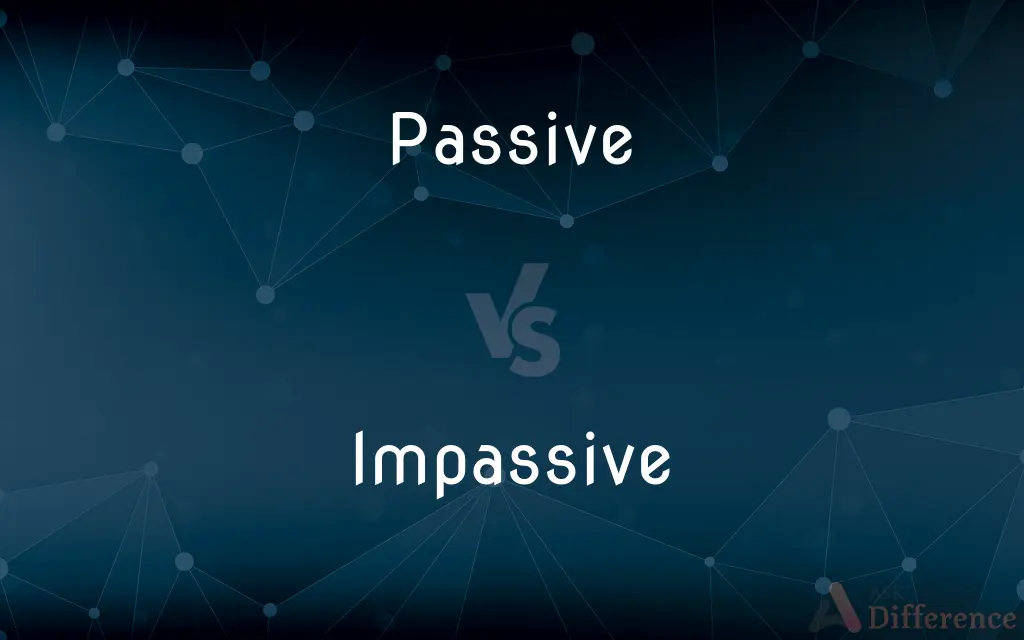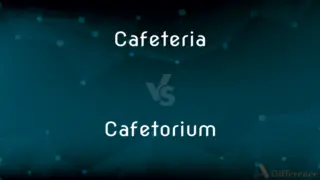Passive vs. Impassive — What's the Difference?
By Fiza Rafique & Urooj Arif — Updated on April 26, 2024
"Passive" describes a lack of active response or resistance, often implying submission, while "impassive" refers to a lack of visible emotion or expression, suggesting stoicism.

Difference Between Passive and Impassive
Table of Contents
ADVERTISEMENT
Key Differences
"Passive" behavior involves allowing things to happen or accepting what others do without active response or resistance, showing a tendency to submit. On the other hand, "impassive" describes a person's expressionless face, revealing no signs of emotion or reaction, emphasizing stoicism or detachment.
In interpersonal dynamics, a passive person may not voice objections or take initiative, whereas an impassive individual might engage actively but without showing any emotional responses, maintaining a composed demeanor.
When discussing strategies or behaviors, "passive" might imply a method where minimal effort is exerted, such as passive management in business. Conversely, "impassive" can refer to the strategic hiding of one's feelings to maintain a tactical advantage in negotiations or competitive scenarios.
In conflict or stress situations, being passive often results in acquiescence or avoidance, while being impassive focuses on controlling emotional expressions, which can be crucial in high-stakes environments like diplomacy or leadership.
The perception of these traits varies culturally; passivity may be viewed negatively as a lack of initiative, whereas an impassive demeanor might be respected as a sign of control and strength, particularly in professional or formal settings.
ADVERTISEMENT
Comparison Chart
Definition
Accepting or allowing what happens without active response or resistance
Not showing or feeling emotion
Typical Contexts
Behavioral, strategy
Emotional, facial expression
Implication of Trait
Often viewed as submissive or unassertive
Seen as stoic or emotionally controlled
Reaction to External Events
Typically non-confrontational, avoids conflict
Maintains composure, does not reveal feelings
Example Usage
Passive resistance in protests
Impassive face during a negotiation
Compare with Definitions
Passive
Not participating actively.
She prefers a passive role in group projects.
Impassive
Stoically indifferent or calm.
She faced the chaos around her with an impassive expression.
Passive
Characterized by lack of active or assertive behavior.
Passive strategies in investment involve minimal buying and selling.
Impassive
Showing no sign of emotion or feeling.
Her face was impassive during the intense scenes of the movie.
Passive
Accepting or allowing what others do without active response.
He remained passive during the debate, not defending his points.
Impassive
Emotionally detached or unresponsive.
His impassive demeanor makes him difficult to read.
Passive
Inclined to accept or go along without resistance.
His passive nature often prevents him from voicing his true opinions.
Impassive
Not revealing thoughts or feelings through expressions.
Despite the criticism, he remained impassive.
Passive
Allowing others to act without intervention.
Being too passive can sometimes lead to missed opportunities.
Impassive
Exhibiting no emotional response.
He listened to the news with an impassive face.
Passive
Accepting or allowing what happens or what others do, without active response or resistance
The women were portrayed as passive victims
Impassive
Not feeling or showing emotion
His cold, impassive face
Passive
Denoting a voice of verbs in which the subject undergoes the action of the verb (e.g. they were killed as opposed to the active form he killed them).
Impassive
Devoid of or not subject to emotion.
Passive
(of a circuit or device) containing no source of electromotive force
A passive optical network is to be installed in 2000 homes
Impassive
Revealing no emotion; expressionless.
Passive
(of a metal) made unreactive by a thin inert surface layer of oxide.
Impassive
(Archaic) Incapable of physical sensation.
Passive
A passive form of a verb.
Impassive
Motionless; still.
Passive
Receiving or subjected to an action without responding or initiating an action in return
The mind viewed as a passive receptacle for sensory experience.
Impassive
Having, or revealing, no emotion.
Passive
Accepting or submitting without objection or resistance; submissive
A passive acceptance of one's fate.
Impassive
Still or motionless.
Passive
Existing, conducted, or experienced without active or concerted effort
“Although tick paralysis is a reportable disease in Washington, surveillance is passive, and only 10 cases were reported during 1987–1995” (US Department of Health and Human Services). “[Many parents believe] that computers are educational and, at the least, less passive than television” (Laurie Hays).
Impassive
Not susceptible of pain or suffering; apathetic; impassible; unmoved.
Impassive as the marble in the quarry.
On the impassive ice the lightings play.
Passive
Of, relating to, or being certain bonds or shares that do not bear financial interest.
Impassive
Having or revealing little emotion or sensibility; not easily aroused or excited;
Her impassive remoteness
He remained impassive, showing neither interest in nor concern for our plight
A silent stolid creature who took it all as a matter of course
Her face showed nothing but stolid indifference
Passive
Of, relating to, or being a solar heating or cooling system that uses no external mechanical power.
Impassive
Deliberately impassive in manner;
Deadpan humor
His face remained expressionless as the verdict was read
Passive
(Grammar) Of, relating to, or being a verb form or voice used to indicate that the grammatical subject is the object of the action or the effect of the verb. For example, in the sentence They were impressed by his manner, were impressed is in the passive voice.
Passive
(Chemistry) Unreactive except under special or extreme conditions; inert.
Passive
(Electronics) Exhibiting no gain or contributing no energy
A passive circuit element.
Passive
The passive voice.
Passive
A verb or construction in the passive voice.
Passive
Being subjected to an action without producing a reaction.
Passive
Taking no action.
He remained passive during the protest.
Passive
(grammar) Being in the passive voice.
Passive
(finance) Not participating in management.
Passive
(aviation) Without motive power.
A passive balloon; a passive aeroplane; passive flight, such as gliding and soaring
Passive
(electronics) Of a component: that consumes but does not produce energy, or is incapable of power gain.
Passive
Where allowance is made for a possible future event.
Passive
(grammar) The passive voice of verbs.
Passive
(grammar) A form of a verb that is in the passive voice.
Passive
(marketing) A customer who is satisfied with a product or service, but not keen enough to promote it by word of mouth.
Passive
(electronics) Any component that consumes but does not produce energy, or is incapable of power gain.
Passive
Not active, but acted upon; suffering or receiving impressions or influences; as, they were passive spectators, not actors in the scene.
The passive airUpbore their nimble tread.
The mind is wholly passive in the reception of all its simple ideas.
Passive
Receiving or enduring without either active sympathy or active resistance; without emotion or excitement; patient; not opposing; unresisting; as, passive obedience; passive submission.
The best virtue, passive fortitude.
Passive
Inactive; inert; unreactive; not showing strong affinity; as, red phosphorus is comparatively passive.
Passive
Designating certain morbid conditions, as hemorrhage or dropsy, characterized by relaxation of the vessels and tissues, with deficient vitality and lack of reaction in the affected tissues.
Passive
The voice used to indicate that the grammatical subject of the verb is the recipient (not the source) of the action denoted by the verb;
`The ball was thrown by the boy' uses the passive voice
`The ball was thrown' is an abbreviated passive
Passive
Lacking in energy or will;
Much benevolence of the passive order may be traced to a disinclination to inflict pain upon oneself
Passive
Peacefully resistant in response to injustice;
Passive resistance
Passive
Expressing thatthe subject of the sentence is the patient of the action denoted by the verb;
Academics seem to favor passive sentences
Common Curiosities
Can someone be impassive intentionally?
Yes, people can intentionally be impassive to conceal their emotions or maintain a strategic advantage.
How does passivity affect team dynamics?
Passivity can lead to uneven work distribution and potential conflict due to a lack of initiative or contributions.
How can one manage their impassive nature?
Being aware of the context and consciously choosing to show appropriate emotions can help manage an impassive nature.
What are the consequences of passive behavior?
Passive behavior can lead to missed opportunities and a lack of influence in personal and professional spheres.
Are there situations where being impassive is considered inappropriate?
Yes, in situations that require empathy and emotional engagement, being impassive can seem uncaring or inappropriate.
Is being impassive advantageous in professional settings?
Being impassive can be advantageous in maintaining professionalism and controlling the emotional tone in business interactions.
What does it mean to be passive in a relationship?
Being passive in a relationship means often conceding or not actively participating in decision-making.
How can one stop being too passive?
Developing assertiveness through practice, setting clear boundaries, and actively participating in decisions can help reduce passivity.
Is it possible to be both passive and impassive?
Yes, someone can be both passive in their actions and impassive in their emotional expression, although these traits address different aspects.
What psychological theories address passivity?
Theories such as behavioral psychology and passive-aggressive behavior explore the roots and impacts of passivity.
Share Your Discovery

Previous Comparison
Meme vs. Troll
Next Comparison
Cafeteria vs. CafetoriumAuthor Spotlight
Written by
Fiza RafiqueFiza Rafique is a skilled content writer at AskDifference.com, where she meticulously refines and enhances written pieces. Drawing from her vast editorial expertise, Fiza ensures clarity, accuracy, and precision in every article. Passionate about language, she continually seeks to elevate the quality of content for readers worldwide.
Co-written by
Urooj ArifUrooj is a skilled content writer at Ask Difference, known for her exceptional ability to simplify complex topics into engaging and informative content. With a passion for research and a flair for clear, concise writing, she consistently delivers articles that resonate with our diverse audience.













































